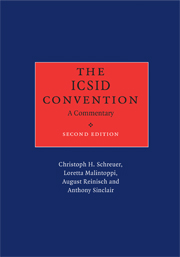Book contents
- Frontmatter
- Contents
- Foreword by Professor Sir Elihu Lauterpacht, CBE, QC
- Authors' preface to the second edition
- Table of cases
- List of abbreviations
- Text of the ICSID Convention
- Procedural calendar
- PREAMBLE
- CHAPTER I International Centre for Settlement of Investment Disputes
- CHAPTER II Jurisdiction of the Centre
- CHAPTER III Conciliation
- CHAPTER IV Arbitration
- CHAPTER V Replacement and Disqualification of Conciliators and Arbitrators
- Article 56 Replacement
- Article 57 Proposal to Disqualify
- Article 58 Decision to Disqualify
- CHAPTER VI Cost of Proceedings
- CHAPTER VII Place of Proceedings
- CHAPTER VIII Disputes between Contracting States
- CHAPTER IX Amendment
- CHAPTER X Final Provisions
- Final Clause
- Consolidated bibliography
- Index by article
- Index by subject
Article 57 - Proposal to Disqualify
from CHAPTER V - Replacement and Disqualification of Conciliators and Arbitrators
Published online by Cambridge University Press: 07 September 2010
- Frontmatter
- Contents
- Foreword by Professor Sir Elihu Lauterpacht, CBE, QC
- Authors' preface to the second edition
- Table of cases
- List of abbreviations
- Text of the ICSID Convention
- Procedural calendar
- PREAMBLE
- CHAPTER I International Centre for Settlement of Investment Disputes
- CHAPTER II Jurisdiction of the Centre
- CHAPTER III Conciliation
- CHAPTER IV Arbitration
- CHAPTER V Replacement and Disqualification of Conciliators and Arbitrators
- Article 56 Replacement
- Article 57 Proposal to Disqualify
- Article 58 Decision to Disqualify
- CHAPTER VI Cost of Proceedings
- CHAPTER VII Place of Proceedings
- CHAPTER VIII Disputes between Contracting States
- CHAPTER IX Amendment
- CHAPTER X Final Provisions
- Final Clause
- Consolidated bibliography
- Index by article
- Index by subject
Summary
INTRODUCTION
Art. 57 is one of two articles dealing with the disqualification of conciliators or arbitrators. Art. 57 deals with the initiation of the proceeding to disqualify and with the basis for a proposal to disqualify. Art. 58 deals with the method of reaching a decision on a proposal to disqualify and the replacement of a person so disqualified. Other instruments governing international arbitration also contain detailed provisions concerning the disqualification of arbitrators.
Provisions concerning the disqualification of a conciliator or arbitrator were contained in all drafts leading to the Convention and underwent certain changes (History, Vol. I, p. 262). The discussions surrounding these provisions centred mainly on whether a distinction should be made depending on who made the appointment (see para. 7 infra), on time limits for a proposal to disqualify (see para. 9 infra) and on whether the grounds for disqualification should be specified in the Convention (see para. 17 infra).
Art. 57 is important in view of Art. 52(1)(a). Under that provision, a party may request an award's annulment if the tribunal was not properly constituted (see Art. 52, paras. 118–129). The procedure for an arbitrator's disqualification is an important means to avoid a later annulment.
- Type
- Chapter
- Information
- The ICSID ConventionA Commentary, pp. 1197 - 1208Publisher: Cambridge University PressPrint publication year: 2009



